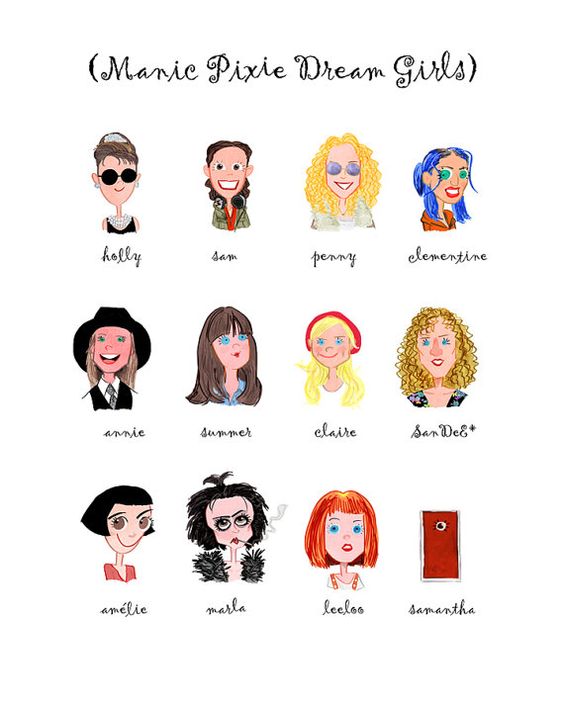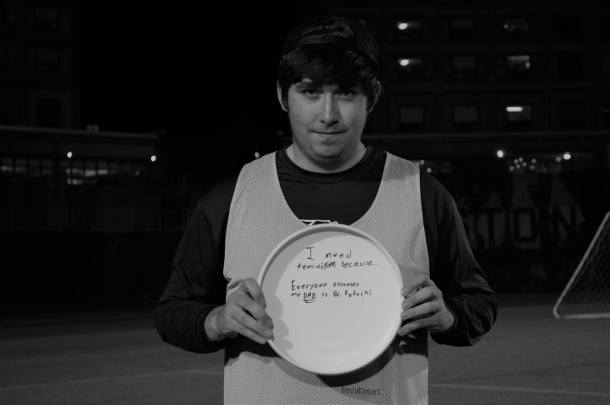By: Avery Serven

The Manic Pixie Dream Girl, a film trope that most of us are familiar with. If not, here’s a quick definition coined by Nathan Rabin: “The Manic Pixie Dream Girl exists solely in the fevered imaginations of sensitive writer-directors to teach broodingly soulful young men to embrace life and its infinite mysteries and adventures. The Manic Pixie Dream Girl is an all-or-nothing-proposition.” Some of the best examples are seen in the lead female characters from films like Elizabethtown, Garden State, Paper Towns, Almost Famous, and (500) Days of Summer.
The Manic Pixie Dream Girl continues to be a character created by white, heterosexual male writers to satisfy a trope that they deemed absent from film. A character trope that, I might add, was designed to satisfy these writers’ own pipe dreams of a girl who could fill their emotional voids. The Manic Pixie Dream Girl exists for the purpose of bringing the brooding cynical “sad boy” male character out of his sheltered world so he can embrace all that life has to offer. She is often white, slim, beautiful, and, of course, quirky; the kind of girl that these heterosexual male characters might call a “cool girl.” She probably has dyed hair, crazy piercings, or listens to The Smiths (see Zooey Deschanel in (500) Days of Summer).
I’ll admit, I’m not a big fan of the Manic Pixie Dream Girl. For women, even a mention of the word “Manic Pixie Dream Girl” will probably elicit some eye rolling. Although she is “not like other girls,” she still only serves one purpose–to change the male lead’s cynical way of living. This ideology is dangerous, because even though the Manic Pixie Dream Girl is just a character on a screen, she represents the larger societal notion that women must complete men. The Manic Pixie Dream Girl does not seem to have any real goals of her own. Instead, her only goal throughout the film is to completely alter the male character by the time the credits role.
I will give the Manic Pixie Dream Girl some credit, though. Many of the female characters that have been placed into this category by film scholars have interesting personalities. They might like unconventional music, wear eccentric clothing, or think about life through a different lens. While these traits often serve as the only basis for the male character to fall in love with the Manic Pixie Dream Girl, I believe that these girls break the mold by creating three-dimensional female characters, who do not fit the standard “Sexpot” or “Brainless Beauty” tropes that most female characters fall under. Unfortunately, while the Manic Pixie Dream Girl definitely doesn’t fit the stereotypes that other female characters often adhere to, her unique outlook on life is usually exploited by the male character for his own needs.
Additionally, although many Manic Pixie Dream Girls only seem to care about their boyfriend’s dreams, many of the girls initially have dreams of their own. While these dreams are rarely fulfilled, the fact that they exist in the first place signifies hope for a change in the future of female film characters.
I believe we can learn a lot from Manic Pixie Dream Girls. Yes, these characters often perpetuate the notion that women, with their spunky attitudes and quirky demeanors, are supposed to help men achieve their goals. And yes, even though they have complex personalities and dreams, they often channel all of their energy into helping the men in their life. However, if in Hollywood writers continue to create three-dimensional female characters and allow them to be passionate about achieving their own dreams, the romance genre could be completely transformed.
Sources
https://film.avclub.com/the-bataan-death-march-of-whimsy-case-file-1-elizabet-1798210595









